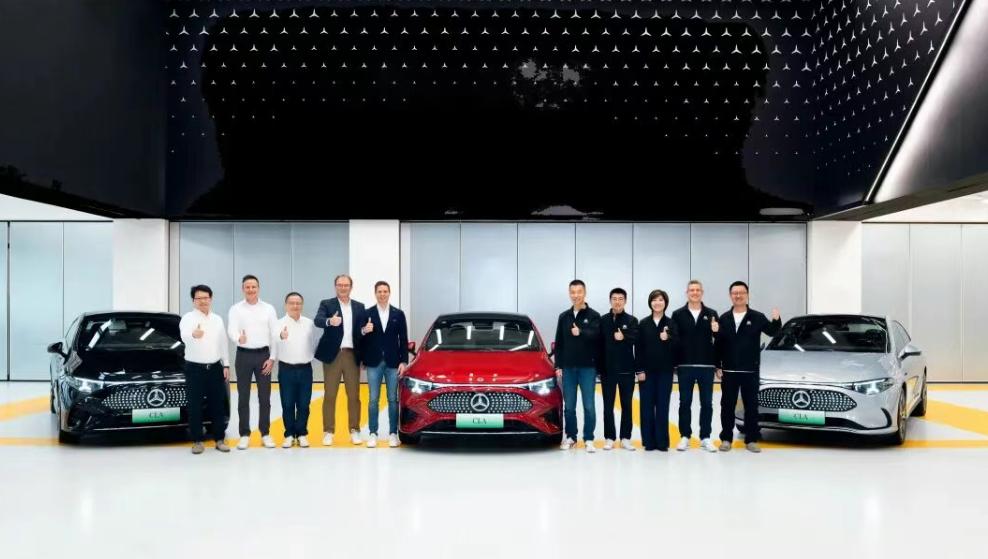German luxury giant deepens its China strategy with smart driving investment
Mercedes-Benz is accelerating its footprint in China’s rapidly evolving intelligent driving sector.
On September 25, Chongqing-based Qianli Technology announced that Mercedes’ wholly owned subsidiary, Mercedes-Benz (Shanghai) Digital Technology Co., had acquired 135.6 million shares of the company at RMB 9.87 per share — a 25% discount to the previous day’s close. The deal is worth roughly RMB 13.39 billion, making Mercedes the fifth-largest shareholder with a 3% stake. Qianli’s major shareholder, Lifan Holdings, transferred the stake after failing to meet obligations on pledged shares, reducing its holding from 13.68% to 10.68%.
Mercedes has pledged not to reduce its holdings for at least 12 months. The announcement sent Qianli’s shares soaring more than 19% in intraday trading, briefly lifting its market capitalization by nearly RMB 10 billion. Founder and CEO Yin Qi, who controls nearly 20% of the company, saw his paper wealth rise by about RMB 2 billion in a single day.
From legacy automaker to AI newcomer
Qianli Technology may be a new name to global investors, but its roots trace back to Lifan Technology, a long-established Chongqing carmaker. Despite early moves into new energy vehicles, Lifan struggled with its transition and ultimately entered restructuring, drawing in Geely as a strategic investor.
The real turning point came with the arrival of Yin Qi. Born in Wuhu, Anhui in 1985, Yin is a computer science graduate of Tsinghua University and later a PhD candidate at Columbia University. During his doctoral studies, he co-founded Megvii (Face++), the AI firm that gained international recognition by outperforming Facebook in facial recognition benchmarks and went on to become one of China’s “Four AI Dragons” alongside SenseTime, CloudWalk, and Yitu.

Under Yin’s leadership, Lifan was restructured, rebranded as Qianli Technology, and pivoted decisively toward advanced driver assistance systems (ADAS). With Geely’s backing, Qianli set up a joint venture — Qianli Zhijia — to serve as Geely’s dedicated smart driving unit. The company also attracted high-profile executives such as Wang Jun, the former president of Huawei’s automotive business unit.
Today, Qianli is already listed on the Shanghai Stock Exchange and has announced plans to issue H-shares in Hong Kong, pending approval from shareholders and China’s securities regulator.
Mercedes and Geely: a deepening alliance
Industry observers view Mercedes’ investment as more than just a financial stake. It is widely seen as a further deepening of ties with Geely.
In 2018, Geely acquired nearly 10% of Mercedes’ parent Daimler, becoming its largest single shareholder. Two years later, the two companies jointly launched the global Smart brand. Analysts say Mercedes’ move into Qianli cements its strategic partnership with Geely in next-generation vehicle technology.
Sources cited by Bloomberg suggest that Mercedes and Geely are also in early talks about possible cooperation in conventional fuel-vehicle projects. Meanwhile, Qianli is expected to support Mercedes’ upcoming electric C-Class and GLC models in China, providing ADAS and related smart driving solutions.
Building a China-centered AI ecosystem
Qianli is Mercedes’ second major bet on China’s intelligent driving ecosystem. The automaker first invested in Momenta, another Chinese autonomous driving unicorn, as early as 2017. Mercedes has since participated in multiple funding rounds and in 2024 committed an additional $75 million.
The partnership has already borne fruit. On the same day Mercedes’ stake in Qianli was announced, the company also unveiled a new ADAS platform co-developed with Momenta. This system, powered by Momenta’s proprietary foundation model, enables “from parking space to parking space” intelligent driving across highways, urban roads, and parking lots. It will debut on the China-built all-electric CLA sedan, slated to launch in October with a pre-sale price range of RMB 259,000 to RMB 299,000.
The new CLA also integrates a suite of Chinese technology features: 800V fast-charging architecture, an 866 km range, Qualcomm’s 8295 chip, and a partnership with ByteDance. ByteDance’s Doubao large language model will power the in-car assistant, enabling natural, emotion-aware conversations and near-instant command execution.
Strategic significance for Mercedes
For Mercedes, these moves underscore a clear recognition: China is not just the world’s largest EV market, but also the epicenter of innovation in intelligent mobility. By aligning with local leaders in AI and autonomous driving, the German automaker is weaving Chinese technology into its global strategy.
“Mercedes is making a pragmatic bet,” said one Shanghai-based auto analyst. “It’s still a German car with German engineering, but increasingly, the intelligence that powers it will come from China.”
As the EV transition accelerates worldwide, Mercedes’ RMB 13 billion bet on Qianli reflects both urgency and confidence: urgency to catch up in electrification, and confidence in China’s ability to deliver the technology backbone for the next era of mobility.

